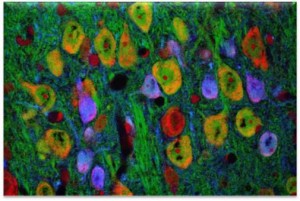Workshops on Rigor and Reproducibility in Microscopy, Quantitation, and AI
Best Practices in Confocal Microscopy, Quantitative Histology (Stereology),
and Artificial Intelligence (AI)
August 4-8, 2025
While the increasing automation of our data collection offers the opportunity for higher throughput and faster results, it remains essential to maintain standards of validation to ensure rigor and reproducibility in our study outcomes. These workshops are designed to cover best practices from experimental design and specimen preparation, through imaging and quantitation. Reliance on AI comes with both great promise and great peril, and these workshops will address the appropriate best practices for all of the input stages for the AI analysis and discuss essential validation considerations. The goal is to produce reliable data that will focus progress in the field.
Components of the Workshop include:
- Background and theory of sample preparation; and in microscope design and use
- Proper imaging approaches and ethics, scientific image construction including a Photoshop tutorial
- Unbiased study design and use of quantitative histology/ stereology
- New topics in cleared tissue, automated confocal stereology, and artificial intelligence
- Post-workshop individual consultation on your research objectives and approaches

REGISTRATION NOW OPEN (early discount ends July 12)
Download the Workshop Program (pdf format) here.
Click here to register on-line
Who Should Attend
- Graduate students who need to use modern microscopy or stereology in their projects
- Postdoctoral fellows who would benefit from a comprehensive introduction to microscopy and stereology
- Young investigators who need to incorporate these analytical approaches into their labs
- Investigators new to histological analysis who need a rapid and complete introduction to these techniques
Summary of the Workshops:
- Attend on-line half-day interactive, live webinars (download the syllabus for topics)
- Participate in Zoom-based Discussion Groups
- Take advantage of subsequent individual consultation sessions on your research needs
- Save the time, expense, and uncertainty of traveling to Chicago
- Remain productive in the lab while participating in the workshop
Experienced Instructor:
Daniel A. Peterson, Ph.D. has been conducting international courses in microscopy and quantitative histology since 1996. Dan is an NIH-funded investigator in neural repair and stem cell biology who maintains an active lab. He is on the editorial board of Frontiers in Neuroscience and Stem Cells and Development among other journals in the field of regenerative medicine and is a frequent ad-hoc reviewer for a number of neuroscience, stem cell, and clinical journals. Dan served as Chairman of an NIH study section (Neurogenesis and Cell Fate) and is Professor and Vice-Chairman of Neuroscience and Director of the Center for Stem Cell and Regenerative Medicine. Recently, Dan was a Fulbright Senior Scholar in Germany and has established several international collaborations. He serves on the Scientific Advisory Board of the Brain Research Foundation and is a past-President of the American Society for Neural Therapy and Repair. In 2019, he was elected to the Board of Governors for the International Society for Stereology and Image Analysis.
Virtual Workshop Registration Deadlines
| Early Bird Rate Ends | Regular Registration Ends |
|---|---|
| 7/12/2025 | 8/4/2025 |
Virtual Workshop Tuition
| EARLY BIRD RATE | REGULAR RATE | |
| Graduate Student or Academic Technical Staff | $1450 | $1650 |
| Postdoctoral Fellow or Academic Faculty | $1700 | $1900 |
| Technical or Scientific Staff from Industry | $2300 | $2600 |
Click here to register on-line
Society Membership Discounts:
Discount of $200.00 if you are a member of ISSIA https://www.issia.net, please email info@neurorenew.com for a discount code
Discount of $200.00 if you are a member of ASNTR https://www.asntr.org, please email info@neurorenew.com for a discount code
NeuroRenew, Inc. and Dan Peterson are not affiliated with the short courses offered by Peter Mouton
What Past-Participants have said about the workshops:
| “… many thanks to you, Dan, for running this course. The amount of theory you managed to cover in 5 days, from basic to advanced, is remarkable. When I got home, I realized that you and the vendors essentially taught a 4 credit-hour (12 week semester) course in 5 days. Thanks for making a course with hands-on time – there are some questions that just don’t come up until you’re running the scope yourself, and the instructors could answer all of them.” Matt Mitschelen, University of Oklahoma HSC” ………. “I would like to thank you for the instructional and enjoyable week of your confocal microscopy course. I was somewhat concerned with the education level of everyone in the class relative to mine, however you did an excellent job of ensuring every person in the room was on the same page. I appreciate your concern for everyone’s learning and found input and explanations from all the instructors very enriching. Your class is set up in an ideal fashion and I can honestly not think of anything to improve upon. Breaks throughout the day help to maintain the groups concentration, the printed Power Point slides allowed us to follow along without taking rigorous notes, and the sessions from 7-10pm are excellent opportunities to relate the course to our personal research.” Nik J., University of Washington |
